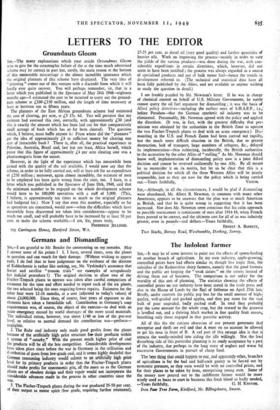The Indolent Farmer
Sist,—It may be of some interest to point out the effects of spoon-feeding on another branch of agriculture. In my own industry, apple-growing, controlled prices have had effects similar to, though less tragic than, the subsidies of the Radnorshire sheep farmers, namely that the good farmers and the public are keeping the " weak sisters " on the streets instead of driving them out of business. The comparison is not unfair for the morality of this sort of planning. The statistics showing the effects of controlled prices on our industry have been stated in the trade press and also in the House of Lords by the Earl of Selborne on April 27th last. Briefly, under controls the public pay less for the small amount of high-i quality, well-graded and packed apples, and they pay more for the vast bulk of poor ungraded, badly packed stuff. In total they probably pay the same amount for the whole crop, but the reward to the growers is levelled out, and a thriving black market in fine quality fruit ensues, benefiting only those engaged in that parasitic activity.
All of this fits the curious obsession of our present governors th4 enterprise and thrift are evil and that A must on no account be allowed to get his nose in front of B. A sad part of this strange idea is that i,
a attracts the woolly-minded into aiding the idle willingly. Not the leas( disturbing side of this particular planning is its ready acceptance by a part of the industry, due perhaps to the long story of neglect and worse by successive Governments in pursuit of cheap food.
The best thing that could happen to our, and apparently other, branches of agriculture is for the bad and half-cock gentry to be forced out by economic pressure, as they soon would be with no controlled prices, ancI for their places to be taken by keen, enterprising young men. Some of the money now poured out to the indifferent farmer would be more wisely used as loans to start in business this fresh blood so badly needed,


































 Previous page
Previous page